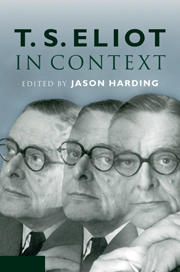Book contents
- Frontmatter
- Contents
- List of illustrations
- List of contributors
- Acknowledgements
- List of abbreviations
- Introduction
- PART ONE LIFE
- 1 St Louis
- 2 New England
- 3 Paris
- 4 London
- 5 Englishness
- 6 The idea of Europe
- PART TWO FORMS
- PART THREE LITERARY CROSS-CURRENTS
- PART FOUR POLITICS, SOCIETY AND CULTURE
- PART FIVE RECEPTION
- Further reading
- Index
2 - New England
Published online by Cambridge University Press: 05 August 2012
- Frontmatter
- Contents
- List of illustrations
- List of contributors
- Acknowledgements
- List of abbreviations
- Introduction
- PART ONE LIFE
- 1 St Louis
- 2 New England
- 3 Paris
- 4 London
- 5 Englishness
- 6 The idea of Europe
- PART TWO FORMS
- PART THREE LITERARY CROSS-CURRENTS
- PART FOUR POLITICS, SOCIETY AND CULTURE
- PART FIVE RECEPTION
- Further reading
- Index
Summary
T. S. Eliot often called himself a New Englander. His relationship with New England, however, had a double quality: positive and negative, inherited but also personal, giving him a source of inspiration but failing to provide an environment that would sustain his poetic career. Although Eliot grew up in a large family in St Louis (see Chapter 1 above), his ancestors had lived in New England for more than two centuries. Eliot remembered that his family ‘guarded jealously its connexions with New England’. They did so by preserving their loyalties and traditions, but also by renewing their contact with the region. When Eliot was a child his family began to spend summers at Cape Ann on the Massachusetts coast. They built a large house at Eastern Point commanding a view of Gloucester Harbor, which Eliot called ‘the most beautiful harbour’ on the New England coast. He spent each summer there from June until September and learned to sail a small catboat skilfully along the coastline. His experiences inspired the images of red granite, pine forest and blue ocean that appear in Ash-Wednesday, ‘Marina’ and ‘Cape Ann’, in the closing lines of ‘The Love Song of J. Alfred Prufrock’, in The Waste Land – ‘The boat responded / Gaily, to the hand expert with sail and oar’ (CPP, 74) – and above all in ‘The Dry Salvages’. He particularly recalled the Atlantic Ocean off the New England coast as one of the great natural forces which ‘impressed my childhood imagination’.
- Type
- Chapter
- Information
- T. S. Eliot in Context , pp. 17 - 24Publisher: Cambridge University PressPrint publication year: 2011

